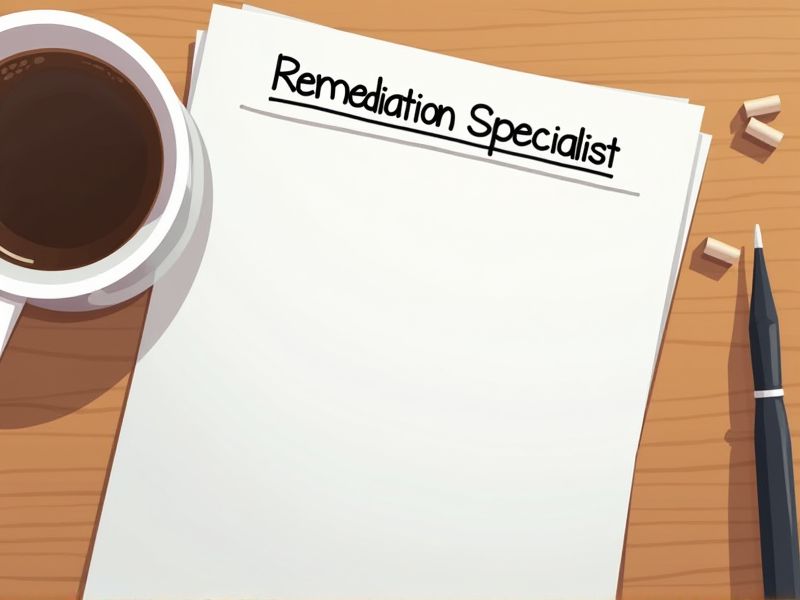
A Remediation Specialist plays a vital role in environmental cleanup and risk management, requiring expertise in various technical and regulatory domains. Certain certifications ensure these specialists have the necessary knowledge to navigate complex environmental regulations and remediation technologies. Certification also enhances credibility and assures stakeholders of a specialist's proficiency in effectively addressing contamination challenges. Here are some important certifications you may need to consider for a career as a Remediation Specialist.
OSHA 30-Hour HAZWOPER Certification
The OSHA 30-Hour HAZWOPER Certification is essential for a Remediation Specialist due to the inherent dangers present in handling hazardous waste and materials. Proper training equips specialists with the knowledge and skills required to safely manage and mitigate risks, reducing the likelihood of workplace accidents and exposure to harmful substances. Regulatory compliance with OSHA standards helps ensure that remediation projects uphold public and environmental safety protocols. Employers value certified specialists as they possess verified competencies, potentially leading to increased job opportunities and project responsibilities.
OSHA 40-Hour HAZWOPER Certification
The OSHA 40-Hour HAZWOPER Certification provides essential training that equips remediation specialists with the knowledge to safely handle hazardous materials. Without this certification, specialists may not fully understand the safety protocols necessary to prevent accidents in hazardous environments. This certification ensures compliance with federal regulations, reducing the risk of costly fines for employers. Proper training also enhances workplace safety, ultimately reducing the likelihood of short-term and long-term health issues for workers.
Certified Hazardous Materials Manager (CHMM)
Employers need CHMMs for a comprehensive understanding of hazardous materials regulations. Proper oversight by a certified professional reduces the risk of regulatory non-compliance. CHMMs offer expertise in safe handling and disposal methods, essential for effective site remediation. Their certified status reassures stakeholders of adherence to industry standards.
Certified Environmental Professional (CEP)
Certified Environmental Professionals (CEP) possess expertise vital for navigating complex environmental regulations, ensuring remediation projects meet legal standards. Their specialized training equips them to assess, manage, and mitigate environmental hazards effectively, thereby safeguarding public health and ecosystems. They are instrumental in developing data-driven strategies for efficient site cleanup, optimizing both time and resources. Certification validates their competency and commitment, instilling stakeholder confidence in the remediation process.
EPA Brownfields Training Certification
Receiving the EPA Brownfields Training Certification equips a Remediation Specialist with the skills required to safely manage and mitigate hazardous substances in contaminated sites. The certification improves a professional's ability to identify potential environmental hazards, reducing the risks associated with incorrect remediation practices. Holding the certification often increases job prospects and competitive edge for specialists in the environmental industry. Certification ensures compliance with federal regulations, contributing to safer and more effective clean-up processes.
Certified Industrial Hygienist (CIH)
A Certified Industrial Hygienist (CIH) possesses the expertise to assess and mitigate health risks in contaminated environments, which is crucial for safely guiding remediation efforts. The CIH's specialized knowledge in exposure assessment and hazardous material management ensures that remediation strategies are both effective and compliant with regulatory standards. By identifying potential environmental and occupational hazards, a CIH reduces the likelihood of harm to workers and the surrounding community. Their input in creating comprehensive safety plans enhances the overall success and efficiency of remediation projects.
Certified Remediation Technician (CRT)
A Certified Remediation Technician (CRT) possesses specialized knowledge and skills essential for effectively addressing environmental hazards. Certification ensures adherence to industry regulations, minimizing risks associated with improper remediation practices. Expertise in handling hazardous substances mitigates potential health and safety threats to both the public and the environment. Employing a CRT boosts credibility and compliance for businesses facing regulatory scrutiny.
LEED Accredited Professional (LEED AP)
The presence of a LEED Accredited Professional (LEED AP) equips a Remediation Specialist with a comprehensive understanding of green building principles, facilitating environmentally conscious cleanup projects. Knowledge acquired through LEED accreditation aids in identifying sustainable materials and methods that minimize the ecological impact of remediation efforts. LEED AP credentials enhance a specialist's ability to integrate energy-efficient solutions, aligning remediation projects with broader sustainability goals. The expertise gained from this accreditation ensures that projects meet recognized environmental standards, potentially increasing project value and client trust.
Project Management Professional (PMP)
Possessing a Project Management Professional (PMP) certification equips a Remediation Specialist with structured project management methodologies essential for coordinating complex environmental restoration projects. Effective communication and leadership skills, reinforced by PMP training, enable the specialist to manage cross-disciplinary teams and stakeholders involved in remediation efforts. PMP's emphasis on risk management provides the specialist tools to anticipate and mitigate potential environmental and compliance risks. The certification enhances the specialist's ability to deliver projects on time and within budget, aligning with industry standards and regulatory requirements.
Board Certified Safety Professional (BCSP)
The role of a Remediation Specialist involves managing environmental contaminants, which requires a deep understanding of safety standards. Achieving BCSP certification ensures that the specialist has met rigorous professional criteria, enhancing credibility. The certification provides professionals with standardized safety knowledge, reducing workplace incidents. Organizations often prefer hiring certified specialists to mitigate liability and ensure compliance with regulations.
Summary
When you obtain certifications as a Remediation Specialist, your competence in addressing environmental hazards is significantly enhanced. Employers will likely recognize your expertise, leading to increased job opportunities and potential salary raises. Certifications deepen your understanding of compliance regulations, resulting in more effective project management. These credentials also elevate your professional reputation, fostering trust among clients and stakeholders.
